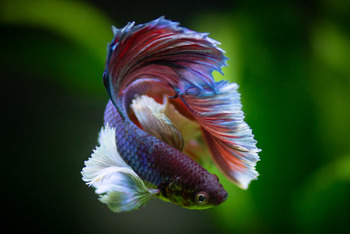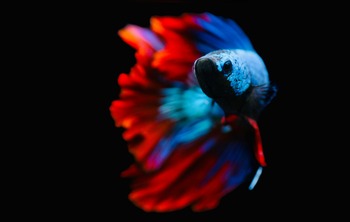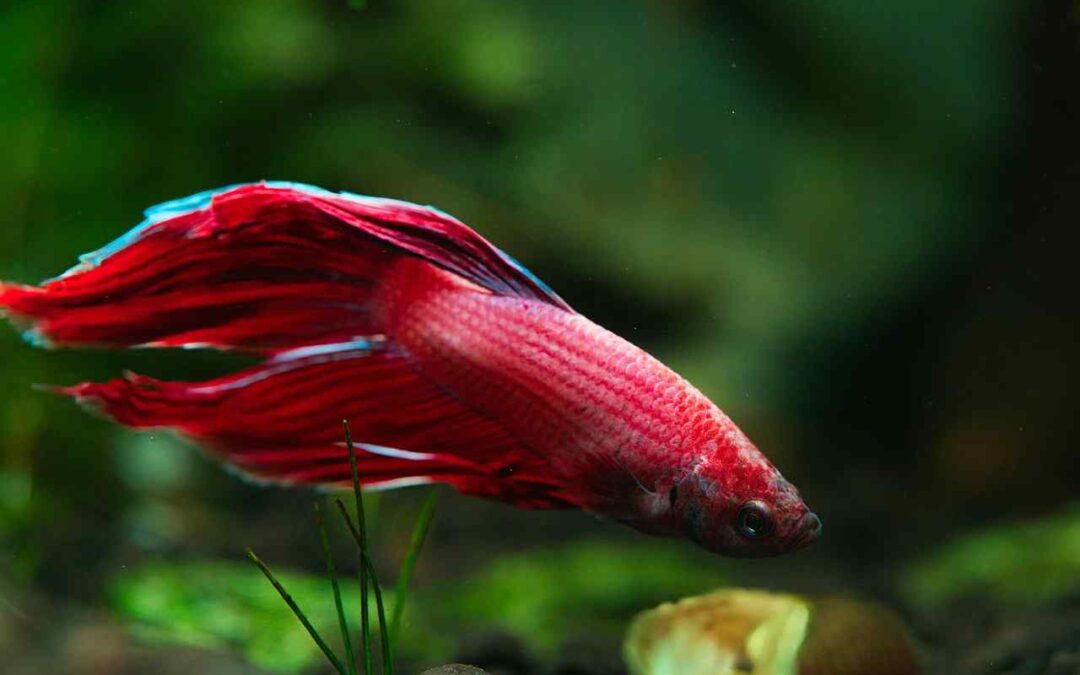If you’re dreaming of a colorful and lively aquarium, it’s only natural to wonder: Can a betta fish live with a guppy? Both of these fish are favorites among beginners and seasoned aquarists alike. They’re easy to care for, full of personality, and bring plenty of color to any tank. But while they may seem like a perfect match at first glance, keeping them together isn’t always as straightforward as it sounds.
The short answer? Yes, bettas and guppies can sometimes live together—but it’s risky, and often not recommended.
Let’s dive deeper into why this combination can be tricky, what risks are involved, and what steps you can take if you want to give it a try.
Why It’s Risky to Keep Bettas and Guppies Together
Mixing bettas with guppies might sound like a great way to create a colorful aquarium, but there are several reasons experts often discourage it. Here’s why:
1. Aggression from Bettas
Male bettas are famously territorial. They’re also quick to mistake brightly colored, flowing-finned guppies for rival male bettas. This can trigger aggression, leading to fin-nipping, chasing, and sometimes serious injury.
2. Stress for Both Fish
Even if no direct fights occur, both fish can experience stress. Bettas, who prefer calm, still water, may find guppies’ constant darting and playful swimming overwhelming. On the flip side, guppies may feel threatened by the betta’s dominant presence. Chronic stress can weaken their immune systems and shorten their lifespans.
3. Behavioral Mismatch
Bettas thrive in still, warm water, while guppies prefer slightly cooler water with more movement. Finding the perfect balance between the two can be difficult, leaving one species less comfortable.
4. Overcrowding and Breeding Issues
Guppies breed very quickly, and overcrowding can happen before you know it. This creates more competition for space and food, leading to tension and stress inside the tank.

Tips for Success (If You Choose to Try)
If you’re determined to give this pairing a shot, you’ll need to plan carefully. While success is never guaranteed, here are some expert-backed tips that can increase your chances:
Choose a Passive Betta
Not all bettas are equally aggressive. Some individuals are surprisingly tolerant, while others will attack anything that moves. Opting for a female betta or a less aggressive male may give you better odds.
Provide a Large, Planted Tank
A 20-gallon tank or larger is highly recommended if you plan to mix bettas and guppies. Live plants and decorations create hiding spots, break the line of sight, and give guppies a chance to escape if the betta gets moody.
Add Guppies First
Introduce guppies before the betta. This way, guppies establish the tank as their territory, making the betta less likely to view them as intruders.
Monitor Closely
Watch for any signs of aggression, such as chasing, nipping, or stressed swimming. Sometimes the betta will tolerate guppies for weeks, only to suddenly turn on them.
Have a Backup Plan
Always keep an extra tank, divider, or breeder box ready. If aggression escalates, you’ll need to separate them immediately.
Control the Population
Stick to male guppies only, or manage breeding to avoid overcrowding. Too many guppies will increase stress levels for everyone.
Additional Considerations Before Trying
Beyond aggression and tank size, it’s important to consider feeding, lighting, and overall maintenance. Bettas prefer slow-sinking pellets and may refuse flake foods that guppies love, so you’ll need to make sure both species are eating well. Uneaten food can quickly foul the water, which stresses both fish.
Tank design also plays a big role. Adding tall plants like Amazon swords or floating plants can help reduce direct confrontation. These act as natural “barriers,” giving guppies a safe place to retreat and bettas a shaded area where they feel secure. Water parameters matter too: both species do well in soft to moderately hard water, but guppies tend to handle a wider range, while bettas are more sensitive to sudden changes.
Lastly, patience is key. Some aquarists report months of peaceful coexistence, while others find disaster within days. No matter how prepared you are, always expect the unexpected and prioritize the well-being of your fish.
Signs That Things Aren’t Working Out
Even with the best preparation, things may go wrong. Watch out for these warning signs:
- Torn or ragged fins (usually on guppies)
- Constant chasing or hiding
- Loss of appetite
- Gasping at the surface or unusual swimming patterns
- Guppies clustered in corners while the betta dominates the middle
If you notice these behaviors, it’s safest to separate them immediately.
Pros and Cons of Keeping Bettas and Guppies Together
If you’re still undecided, here’s a quick rundown of the main advantages and drawbacks:
✅ Pros
- Colorful display: Both species are vibrant, making for an eye-catching tank.
- Similar care needs: Bettas and guppies both prefer warm, freshwater environments.
- Possible peaceful coexistence: With the right setup and a passive betta, it can
- Engaging to watch: Guppies’ active swimming contrasts nicely with a betta’s graceful movements.
❌ Cons
- High aggression risk: Male bettas often attack guppies, mistaking them for rivals.
- Stress for both species: Constant chasing or hiding can shorten lifespans.
- Behavioral mismatch: Bettas like calmer water, while guppies enjoy more movement.
- Overbreeding problems: Guppies reproduce rapidly, leading to overcrowding and tension.
- Unpredictable outcomes: Even with all precautions, success depends heavily on the betta’s temperament.
Alternatives to Keeping Bettas and Guppies Together
If you love both bettas and guppies but don’t want the stress of a risky tank setup, here are some safer alternatives:
- Keep separate tanks. You can enjoy both species without conflict while still appreciating their beauty.
- Try community-friendly fish with guppies. Neon tetras, mollies, platies, and corydoras catfish are generally peaceful companions for guppies.
- Pair bettas with calmer tank mates. Bettas often do better with bottom-dwellers like kuhli loaches or small snails, which don’t threaten their territory.
FAQs About Bettas and Guppies
1. Can male bettas live with male guppies?
It’s not recommended. Male bettas often mistake colorful male guppies for rivals, leading to aggression.
2. What about female bettas and guppies?
Female bettas are typically less aggressive, so they’re more likely to coexist peacefully with guppies, especially in a larger tank.
3. How big should the tank be if I want to try this?
At least 20 gallons, with plenty of live plants and hiding spots. The more space you provide, the lower the chances of conflict.
4. Will guppies nip at bettas?
Yes, it can happen. Guppies are curious and sometimes nip at long, flowing betta fins, which can provoke retaliation.
5. Can I keep just one betta with a group of guppies?
Yes, but proceed with caution. One betta with a small group of guppies can work better than multiple bettas or overcrowded guppy groups.
6. Do guppies and bettas eat the same food?
They have similar diets and can share many foods like flakes, pellets, and frozen/live treats. However, you’ll need to ensure both are getting enough nutrition.
7. How do I know if my betta is too aggressive for guppies?
If your betta constantly chases, flares, or bites guppies—even after a few days of observation—it’s too aggressive and should be housed separately.
8. What are good alternatives to guppies for bettas?
Snails, shrimp, or peaceful bottom-dwelling fish like corydoras are usually safer options.
9. Can I use tank dividers instead of separate tanks?
Yes, dividers can keep the fish in the same aquarium while preventing direct contact. This allows you to enjoy both species without the risk of fighting.
10. Is it worth the risk to try keeping them together?
For beginners, no. For experienced fishkeepers who enjoy experimenting and are prepared to act quickly if problems arise, it might be worth trying—but always put the fish’s well-being first.

The Bottom Line
So, can a betta fish live with a guppy? Technically, yes—but it’s a gamble. Success depends on the betta’s temperament, tank setup, and your willingness to monitor and intervene when necessary.
If you’re new to fishkeeping, it’s usually better to avoid this pairing. But if you’re an experienced aquarist with time, patience, and a backup plan, you might be able to pull it off. Just remember: the health and safety of your fish should always come first.






